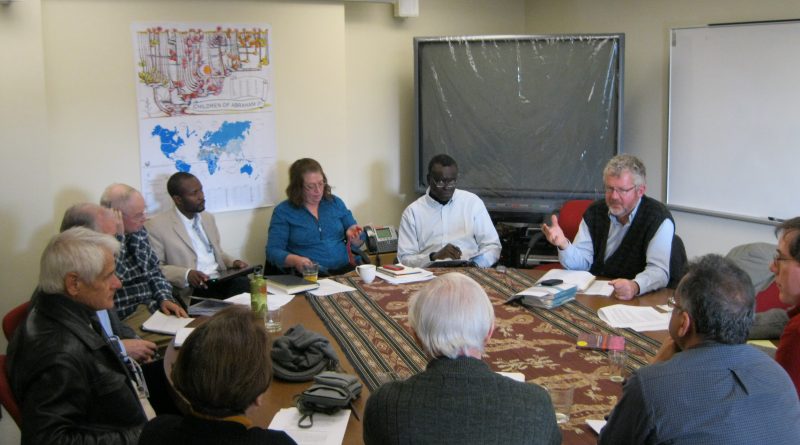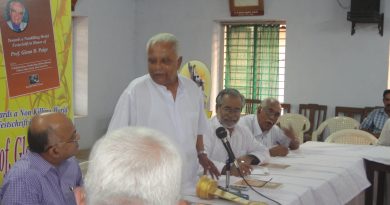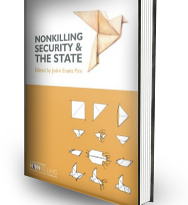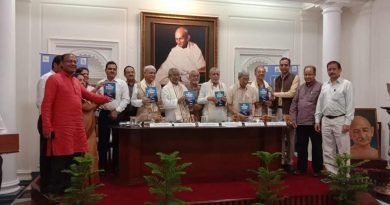Nonkilling Societies Colloquium Reports Available
Several reports have been released following the two-day “Nonkilling Societies Exploratory Colloquium” organized by CGNK in Montréal on November 16-17. The celebrated “Peaceful Societies” website has published five reports and reviews of the AAA Panel session on nonkilling, the Nonkilling Anthropology Research Committee meeting and individual reports of featured presentations. All are available online:
1) Review of the book “Nonkilling Societies” published by CGNK;
2) Review of Kirk Endicott’s paper on the Batek (Panel session);
3) Review of Alberto Gomes’ paper on the Semai (Panel session);
4) Discussion of Douglas Fry’s summary of the AAA Panel Session;
5) Review of the Nonkilling Anthropology Research Committee meeting.
Additionally, CGNK has circulated a “Draft List of Recommendations for Next Steps” following the discussions gathered during the exploratory meting of the Nonkilling Anthropology Research Committee convened on November 17 at the Canada Research Chair on Islam, Pluralism and Globalization, Université de Montréal.
Participants included: Patrice C Brodeur (University of Montreal), Poranee Natadecha-Sponsel (Chaminade University), Leslie E. Sponsel (University of Hawaii), Alberto Gerardo Gomes (La Trobe University), Kirk M Endicott (Dartmouth College), Bruce D. Bonta (Pennsylvania State University), Douglas P Fry (Abo Akademi University), Charles M.H. Keil (Jubilation Foundation), Charles Macdonald, Institute for Advanced Study), Thomas A Fee (Center for Global Nonkilling), Joam Evans Pim (Center for Global Nonkilling) and three Graduate students from the Canada Research Chair on Islam, Pluralism and Globalization.
Main recommendations included:
1) Establish a AAA Section or Interest Group
Participants considered the importance of institutionalizing and seeking wider audiences and recognition for the anthropological study of peace, nonviolence and nonkilling. Regardless of which of these options is pursued, participants agreed in the importance of expanding the Nonkilling Anthropology Research Committee (currently 55 members) as a basis for future networking and collaboration. The obvious gender and geographical (between high income and low and middle income countries) imbalance within the RC makes the broadening of the group especially important.
2) Nonkilling Anthropology Joint Syllabus
Participants considered the importance of a joint syllabus to be composed by the Nonkilling Anthropology Research Committee, building upon the curricular experience of the group and pooling useful resources for reading and research. As many of the RC members already teach related courses, a first step would be for all to share their existing syllabi and suggest other resources (preferably, those that can be shared without licence restrictions). A draft syllabus would be submitted to the RC for discussion and, after approval, it would be made available online for free with associated readings and resources.
3) Dissemination strategies: popular and academic press
The whole group agreed on the need to challenge prevailing Hobbesian views of humans as inherently violent beings both in the popular and academic press. An effort should be made not only to reach out to anthropologists but to other segments. Suggestions included joint articles for major scientific journals but also for major newspapers and Sunday supplements. As for the anthropological periodicals, several suggestions came forward regarding the possibilities both of editing of special issues to allow for the publication of the papers presented at the AAA meeting with additional contributions and of introducing co-authored articles that present the main issues that have been discussed to the larger community.
4) Workshops and conference sessions
Participants considered the benefits of small face-to-face meetings as way to share knowledge and advance with new initiatives. The idea of meetings within meetings (as done with this year’s AAA conference) was supported, as it combines the benefits of reaching out to the wider scholarly community and having focused time for discussion among smaller groups. The possibility of smaller, perhaps regional, workshop meetings that could be convened with small grants was also suggested. Alternative, non-carbon options such as Skype-meetings, webinars and other e-strategies to work together and disseminate should also be explored.
5) Enduring product(s)
Participants praised the value of common resources, such as Bruce Bonta’s Online Encyclopedia of Peaceful Societies, and highlighted the value of new products that can help convey evidence and implications. These could include documentary films, web portals and infographics (maps, charts, …) building on ethnographical data. Compilation of resources (articles, books, course syllabus, events, papers, reports, …) is also encouraged. A future tool such a Peaceful Human Relations Area Files (PHRAF) could be a way of further developing existing resources such as www.peacefulsocieties.org. Finally, a research papers contests could be a form of encouraging new researches to take on an interest for the anthropological study of peace, nonviolence and nonkilling.
The “Nonkilling Societies Exploratory Colloquium” was the second Exploratory Colloquium organized by CGNK, exploring, in this case, the role of cultures in contributing to a world without killing, bringing together a group of prominent scholars from a wide array of theoretical, empirical and methodological approaches and also different academic and geographical backgrounds.
The Colloquium encompassed a full session on nonkilling at the American Anthropological Association 110th Annual Meeting followed the next day by an open debate based on an agenda, list of discussion topics and objectives agreed upon before-hand by the Nonkilling Anthropology Research Committee members and additional participants. This meeting was be co-sponsored by the Canada Research Chair on Islam, Pluralism and Globalization, at the Université de Montréal.
The Colloquium challenged the still prevailing Hobbesian view of humans as inherently violent beings exploring existing killing-free societies, comparing nonkilling practices among other cultures and scrutinizing ethnographic misrepresentations shaped by the assumption of human intraspecific lethal predisposition.
Program
The Colloquium consisted of a two-day gathering focused on
– the socio-cultural causes of killing;
– the socio-cultural causes of nonkilling;
– the socio-cultural transformations relevant to building societies where human killing is greatly reduced and eventually absent (i.e., killing-free societies, with no killing, threats to kill or conditions conducive to killing).
Day one took the form of an organized session at the American Anthropological Association 110th Annual Meeting, with the general title: “Challenging the Legacy of Innate Depravity: The New Tidemark of the Nonkilling Paradigm”. The session was organized by Leslie E. Sponsel (University of Hawaii) and Joam Evans Pim (Center for Global Nonkilling) and Chaired by Poranee Natadecha-Sponsel (Chaminade University) including Kirk M Endicott (Dartmouth College) and Douglas P. Fry (Abo Akademi University) as discussants. Abstracts for the eleven papers that were presented are featured in the PDF program. The session was followed by an initial discussion, continued by a full day of debate at the Canada Research Chair on Islam, Pluralism and Globalization, Université de Montréal.




